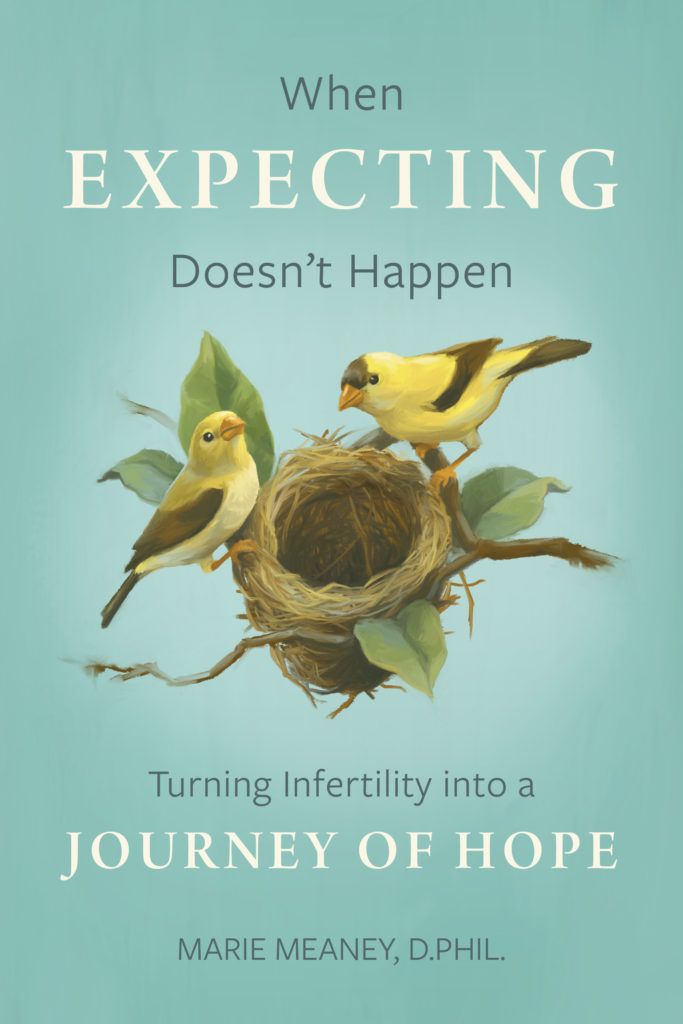
DON’T GIVE ANY UNASKED-FOR ADVICE: We can more easily hurt people suffering from infertility by saying something rather than nothing. We should not feel that we have to give advice. If the right thing does not come to mind, then it is better to listen with compassion, saying simple things such as, “I am so sorry you are undergoing such pain.” If this comes from the heart, then it will be very soothing. Often, we would like to give some kind of pertinent counsel that will liberate people from their suffering. But in all likelihood, nothing we are going to say is going to resolve their problem. Instead, showing empathy speaks to the heart rather than to the mind, and is therefore most likely to be truly consoling. We may not feel like we have done anything helpful since we haven’t been able to remove their pain, but it will give the kind of encouragement that makes the journey bearable. Simon of Cyrene could not liberate Christ from the Cross, but he helped Him carry it.
DON’T BRING UP THE TOPIC: In ninety-nine cases out of one hundred, I would recommend not broaching the subject. The person concerned may not want to talk about it at the moment or perhaps simply not with you, and this should be respected. The couple’s infertility is a very sore topic, and bringing it up when they are either in great pain or—for the moment—happily not thinking about it may not be helpful. If they mention it, then this is different, and listening to them with attention and compassion will bring some relief and is a true work of mercy. However, if you are close to the couple or one of the spouses, you may indicate that you’re happy to talk about it, if they so wish, but that this is completely up to them and that you do not want to exert any pressure whatsoever. Some may ask, though, whether there isn’t an obligation to make sure the couple is not contracepting or using natural family planning when they ought not to. I have found it ironic that even my husband and I have been approached in that way despite our pro-life commitment and my husband’s longtime work for a pro-life organization. Additionally, an infertile friend of mine who worked in the pro-life movement had similarly been asked why she was doing this work instead of having children and staying at home. This is adding insult to injury. It is important to realize that if you are not close to the couple or if you are not in a position of spiritual authority(such as a priest), then it is not your task to raise that issue, except if it comes up naturally. While the infertile couple would be tempted to react in an uncharitable way to such nosey questions, my husband and I decided to answer along the lines of: “We are very sad not to have children. Could you please pray for us?”
CURIOSITY: Furthermore, I’d like to emphasize the importance of avoiding curiosity. I have found that some people would love to know the reason for one’s infertility. Being asked about the reason for one’s childlessness and sensing that curiosity is a motivating factor is painful. Instead of receiving sympathy, one becomes the victim of voyeurism. Being a topic for gossip, or simply an idle news item, is very jarring. I found it hurtful to be asked what my medical issues were, assuming that the problem must have been me rather than my husband.
Stories along the lines of, “Once I (or someone else) had given up the hope of having children, I became pregnant” are less than helpful. This may be true, or the reason for the pregnancy may have been different and one just doesn’t know it: the point is that this kind of story seems to insinuate that the woman is obviously not detached or not abandoned to God’s will, for otherwise she, too, would have conceived. Stress—and there is a lot of stress that builds up with infertility—may be an important factor. But people don’t become less stressed by being told not to be stressed. Frequently, all that is achieved is making them stressed about being stressed.
WALKING ON EGGSHELLS: It may seem like you have to walk on eggshells around infertile couples. It can seem almost impossible to talk to them without hurting them. No! Please do not get this impression, though it is good to try to be sensitive as to how you come across. It is true that with certain couples, the mere allusion to a birth or baptism will be painful. Their suffering is obviously great, but you cannot take responsibility for their pain either, not even for that which has been caused inadvertently. Everyone has their own wounds, and there is always the risk of stirring them up without being aware of doing so. Whatever may be the case, if you are motivated by charity, then even clumsy mistakes will probably not hurt the couple in the same way as those who manifest hardness of heart or lack compassion. This kind of situation is a school of love for both sides. By recognizing our own wounds, we are more willing to forgive another. And if others react badly, it helps to realize that their anger has its source in pain. Hence, tactlessness or a wrong comment are perhaps the expression of another person’s own wounds and ill-lived sufferings. Infertile couples as well as the people surrounding them need to learn how to forgive each other, even if in this situation the first are more often the ones sinned against than the latter. For they are in a position of great vulnerability, their pain being very raw. Perhaps more common to our experience is to have unmarried friends who suffer tremendously from being single. We will still talk about our husbands or wives or current joys and pains arising from our family life around them. At the same time, we probably will be sensitive enough not to gush too much about our spouses, how wonderful it is to be married, and soon, if we know that this causes greater pain.
INVITATIONS TO BAPTISMS AND BABY SHOWERS: What should people do about invitations to baby showers and baptisms vis-à-vis infertile couples? This question leaves many who would like to avoid hurting those suffering from infertility as much as possible feeling puzzled. My experience has been that it is good to invite them to these events, otherwise they might feel excluded. At the same time, the infertile couple should feel free to turn down the invitation if it is too difficult for them. And people should not be offended if infertile couples don't accept their invitation, even if they are closely related (for example siblings). The pain may simply be too strong, especially after many years of infertility.
Again, one should avoid suggesting to the couple that they should really be over their pain by this point and that they should pull themselves together, at the very least out of love for their family or friends. We simply cannot judge what they are going through. Rather than sending them on a guilt trip, it is much more helpful to tell them how much their presence would give one joy, but that they should feel free to come or not. To put pressure on them not only shows a lack of charity, but the risk is great that the celebration might be affected by their pain and resentment at having been forced to come.
As I already mentioned, those who are suffering from infertility should feel free to turn these invitations down. If the invitations are not from close friends or family members, then they can do so without further explanation. If it requires some justification, then they can simply state that they are very sorry not to be able to come, but that it is too painful at the moment and that this is no reflection on their joy for the friend or family member.
At the same time, I might want to ask myself each time whether I don’t have it in myself to go to this baptism or baby shower, even if it is very painful. Perhaps this is a challenge I am now capable of facing. If people see me cry, well then, so be it. This could be a wake-up call for them as to how great a suffering this is. Or perhaps, by the grace of God, attending the baptism or baby shower may not be as difficult as envisaged.
I remember going to the baptism of a niece after seven years of infertility. The Benedictine priest, who did not seem to have much pastoral experience with this suffering, spent the whole sermon speaking about how a woman feels the love of God most strongly when she is having a child. This left the childless women present (and I was not the only one) out in the rain. Normally, I would have been cut in two from these words. However, for some reason, I was able to shake it off and simply say to myself that this priest was not only very insensitive but also downright wrong. For where does that leave the many childless saints, nuns, or simply unmarried women who never had biological children? Does it make sense that God would not let them experience His love for them as strongly as those women giving birth?
Let me conclude this point by emphasizing that there is no right or wrong answer to these kinds of invitations. It depends simply on each individual case and what God is calling me to do at the moment; perhaps God is asking me to be gentle on myself and not put myself in a painful situation, or He may be challenging me to do so. This is between me and God, and it is not about what others think.
Marie Meaney is a specialist on the French philosopher and mystic Simone Weil, on whom she has written two books. She holds graduate degrees in modern languages and philosophy from Oxford University and the International Academy of Philosophy (IAP) in Liechtenstein. She taught at the University of Villanova in Philadelphia before the birth of her daughter. Since then, she has taught courses for the International Theological Institute in Trumau, Austria. Her previous work on infertility has been published in French, German, Croatian, Hungarian, and Spanish.
You Might Also Like
When a couple faces infertility, the intense suffering can be hard to bear–and to convey to others. In When Expecting Doesn’t Happen, Dr. Marie Meaney offers hope and encouragement to couples and advice for those who wish to support them.
With firsthand knowledge, Meaney helps couples navigate the experience of infertility and unpacks Catholic teaching on reproductive technologies. Outlining which licit approaches can be taken and the “dead ends” offered by reproductive technologies which undermine the dignity of the couple and their potential children, When Expecting Doesn’t Happen contains both practical and spiritual wisdom to guide couples toward deep peace and authentic fulfillment.
